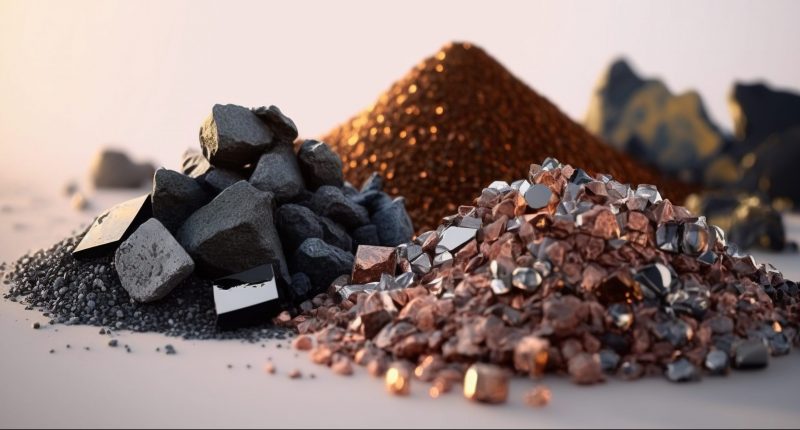Ark Mines (ASX:AHK) has published its Exploration Target for its Sandy Mitchell Rare Earth Element (REE) Project, coming in at 1.3B – 1.5B tonnes @ 1,250-1,490ppm monazite equivalent (MzEq).
While exploration targets are “conceptual in nature,” the estimate was calculated on the back of a recent drill run on-site Sandy Mitchell.
Ark Mines published its maiden JORC-compliant Mineral Resource Estimate (MRE) for Sandy Mitchell back in late May, and the company wrote on Tuesday the exploration target further adds to that. Ark’s existing MRE calculated 21.7Mt of ore @ 1,419ppm MzEq.
Meanwhile, only a tiny fraction of the company’s acreage has so far gone towards forming that MRE.
“The sheer scale of the Sandy Mitchell Exploration Target, up to 1.5 billion tonnes, delivers a clear statement that this is one of the world’s largest surface-expressed, sand-based placer Rare Earth deposits,” Ark Mines Executive Director (ED) Ben Emery told shareholders on Tuesday.
Placer deposits are those formed by the concentration of minerals from weathered debris. Minerals part of the REE family can concentrate in gravels by riverbeds in the same way that gold can – otherwise known as alluvial mining.
And for the uninitiated, Monazite is a radioactive mineral well known to coincide with REE mineralisation in more than one type of host rock. (For this reason, this is why the Australian nuclear safety regulator often undertakes REE assaying work.)
“Most of the processing has already been done by mother nature, so to produce a monazite concentrate, simple, low-cost gravity separation is all that is required,” ED Ben Emery said.
“Our pre-feasibility study, which has commenced, will illustrate this.”
From that feedstock, Ark’s exploration target highlights one potential path toward producing a basket of high value Heavy Minerals (HMs) equalling 15.6-22.3M tonnes of contained HM.
The company’s exploration target laid out production guidance for monazite itself, as well as xenotime, zircon, rutile and ilmenite. But there’s better known decarbonisation-facing rare earths in the mix, too.
Ark on Tuesday added the element proportion of high-value magnetic rare earth oxides (MREOs) was 24% of the total basket – that includes neodymium, praseodymium, dysprosium and terbium.
Room for growth
Ark Mines believes this makes Sandy Mitchell one of the most enriched MREO deposits.
Not only that, the company also believes its exploration target places Sandy Mitchell in the running for world’s largest surface expressed terrestrial placer REE project.
The company described its project economics as “very affordable” on Tuesday.
Much of that has to do with the project’s placer deposit geology, which is inherently less burdensome from a CapEx perspective.
Both geological resource calculations were based on mineralisation from surface (being a placer deposit) down to depths around 11 metres.
Ark sees this as a great advantage, given there’s no overburden removal; relatively simple and thus lower cost mining activities, and low environmental impact.
Worth noting is the company’s existing MRE was “developed from only 1.2% of the available anomaly area at Sandy Mitchell.” This makes the Exploration Target – in the billions of tonnes – well within the realm of reality, according to the company.
Downstream concentrate success
Placer deposit style mineralisation could be, geotechs’ best wishes in order, similarly found from surface to around 12 metres depths beyond the current boundary envelope encapsulating the current MRE mineralisation.
That would be ideal, seeing as tests have already shown the placer deposit ore can successfully produce rare earth concentrates.
Simple gravity separation shoed material amenable to straightforward beneficiation. There, again, Ark sees a lower cost profile.
Final assays boasted 51.9% total rare earth oxide (TREO), including lanthanum, cerium, praseodymium, neodymium, dysprosium, and terbium – often seen by ASX traders as the ‘high value’ basket of rare earths including heavy rare earths.
Cerium oxide came in strong in past metwork tests with recovery from gravity feed to concentrate estimated at 71.7% with evidence it could climb higher, over 83%.
Market demand for rare earth elements is predicted to increase into the 2030’s.
PFS on track
With those test results well at fore of mind, the company is currently progressing a Pre-Feasibility Study (PFS) for the Sandy Mitchell REE project – as well as an expanded phase 2 MRE adding to the maiden JORC.
The PFS is on track for Q4 of CY2024, with the company ultimately targeting the buildout of a straightforward low cost gravity separation plant capable of concentrating monazite.
Ark’s Executive Director Ben Emery outlined the potential scale of the project to investors on Tuesday.
“With the consistent grades of rare earths and heavy minerals from surface to only ~11 metres deep, we are working with an exceptionally large and very simple deposit with an extremely low environmental impact,” Emery said.
“Sandy Mitchell has considerable advantages over projects where rare earths are housed in ionic clays or hard rock material.
“While pre-feasibility work continues, we are also busy incorporating the second phase of drilling into an updated MRE and we are now advancing on mining and other relevant project permits.”

